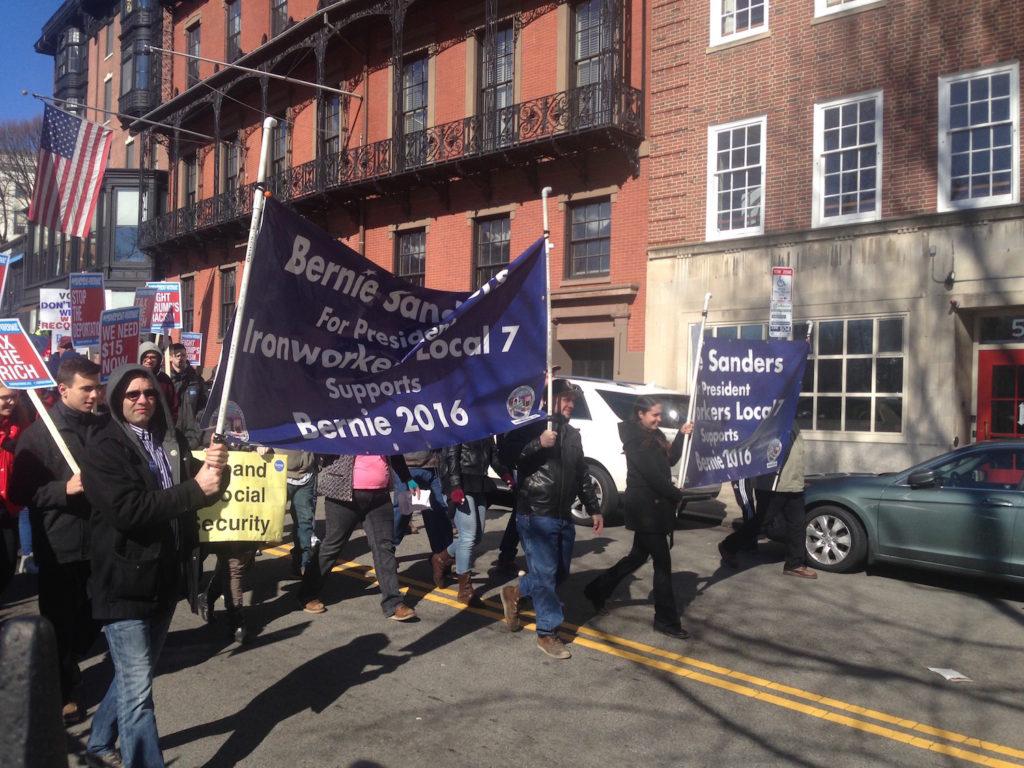By Liam Hofmeister, editor-in-chief
A cacophony of chants bounced among the Financial District business offices’ facades as nearly 750 supporters of presidential candidate Bernie Sanders, I-Vt., paraded down Winter Street off Boston Common.
However, according to Super Tuesday results, the shouts of Sanders’ popular support could not rout presidential candidate Hillary Clinton’s campaign. Clinton prevailed in Massachusetts Tuesday, winning 50.1 percent of the vote, while Sanders only held 48.7 percent according to the latest Real Clear Politics poll. In Boston, Sanders lost by about 17,000 votes, bringing into question the efficacy of Sanders’ grassroots campaigns in Massachusetts.
Sanders’ rally on Saturday, Feb. 27 was organized by Socialist Alternative, a workers advocacy group that endorsed the senator’s nomination. The march started at the steps of the State House. Elan Axelbank, a Northeastern University third-year sociology major and co-op with Socialist Alternative, led the march as emcee, starting chants in front of the government offices.
Axelbank said the rally culture around Sanders’ campaign shows people want something new from government.
“Rallies and protest movements are indicative of a break from the status quo,” he said. “Clinton doesn’t need rallies. She has big money behind her campaigns. Then you look at Sanders, and small donations drive his campaign. The only way to counter Hillary Clinton is with the antithesis of her strategies.”
In Massachusetts, Sanders’ strongest demographic is among the college-aged population, and given Boston’s number of students, some polls predicted a win for the Vermont senator. In a Feb. 27 national poll conducted by YouGov and The Economist, Sanders led Clinton by 22 percent among voters under 30 years old.
Zach Bauer, a freshman bioengineering major, was at the rally, ready to support Sanders’ proverbial “political revolution.”
“He wants economic reform to bring the country back to everyone,” Bauer said. “He’s unaffiliated from any large donors; it’s such a strong grassroots campaign. People really do want change.”
Due to Sanders’ almost across-the-board liberal views, the senator draws audiences that support very specific policies. Robert Gorman, a Chelsea resident, came out with a list of reasons he supported Sanders.
“One, I support him for the national legalization of marijuana,” Gorman said, wearing a shirt, necklace and hat all emblazoned with marijuana leaves. “Two, the ending of college debt, and three, make the rich pay their fair share.”
At the rally, volunteers from Socialist Alternative and other activist groups encouraged ralliers to remember to vote at the Super Tuesday polls to a bittersweet end. Kate Brown, a graduate student in the media innovation program at Northeastern University who supports Clinton, said despite the results, a close race was not a win for Sanders.
Rally attendees carried signs through the streets demonizing Republican presidential favorite Donald Trump and Clinton, chanted in a call-and-response “Tell me what democracy looks like? This is what democracy looks like” and called to passersby to join their #movement4Bernie – the campaign’s hashtag – but Brown was unimpressed by the din of Sanders’ rallies.
“Passion does not equal votes,” Brown said. “It’s a fantastic thing to get people up and out of their houses, but this isn’t what it takes to lead a country and win. She [Clinton] has years and years of contacts and can get people out to vote.”
Even though Sanders lost Massachusetts in the polls, Axelbank considered the state a win and said Socialist Alternative has a backup plan in case Sanders’ bout for Democratic nomination is unsuccessful.
“If you look at the way that Sanders started months ago, polling at only six or seven percent, for him to get 48 percent is huge,” Axelbank said. “The most important thing now is to keep the energy going. Even if he doesn’t win the Democratic nomination, we want him to continue on to the be the Independent nomination. Either way, I still think this is a victory.”
Photo by Liam Hofmeister









